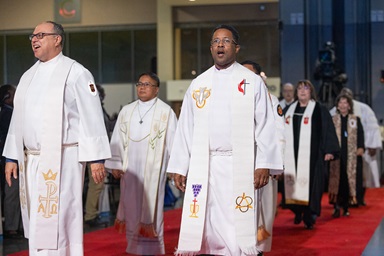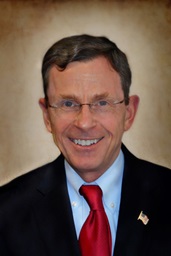The United Methodist Church’s top court released three decisions and a memorandum March 17 responding to questions raised during annual conference sessions.
The memorandum clarified an earlier ruling regarding church disaffiliations.
The Judicial Council also has agreed to take up two requests for declaratory decisions from the Council of Bishops.
In one request, bishops asked the Judicial Council whether annual conferences — church regional bodies — can leave the denomination under current church law. For that new docket item, briefs are due April 12 and reply briefs April 22.
In another, the bishops asked whether they could schedule regular U.S. jurisdictional conferences to elect and assign bishops before the coming General Conference, the denomination’s top lawmaking assembly, now scheduled for 2024. If the Judicial Council says yes, the bishops have tentatively set Nov. 2-5 this year for the jurisdictional meetings. Briefs for this docket item are due April 19 and reply briefs are due April 29.
Church law requires the Judicial Council to accept briefs before rendering any rulings. Any interested party or other person who wishes to comment on any matter coming before the court may submit a brief, according to Judicial Council rules.
In the meantime, the church court continues to work through older items on its fall 2021 docket. The Judicial Council previously ruled any postponement of General Conference resets the submission deadlines for proposed legislation. The church court also released six rulings related to a new church law that allows congregations, under limited conditions, to leave the denomination with property.
In Memorandum 1433, the Judicial Council modified an earlier ruling related to a church disaffiliation in the Alabama-West Florida Conference.
The court ruled in Decision 1421 that conference leaders acted contrary to church law when they closed the sale of Woodlawn United Methodist Church before the annual conference had the chance to ratify the congregation’s disaffiliation agreement. The decision said, “The execution, delivery and filing for record of any deed to property cannot be accomplished prior to such ratification.”
In the March 16 memorandum, the church court clarified that the holding “shall be prospective and not affect the actions taken by the Alabama-West Florida Annual Conference concerning the Woodlawn UMC at its 2021 session.”
In the other decisions released March 16, the church court dealt with questions of church law raised during U.S. annual conference sessions.
Bishops explore disaffiliations, jurisdictional meetings
Bishops routinely face questions of law during the sessions at which they preside. The Book of Discipline — the denomination’s policy book — requires that any bishop’s decision of law must go before the Judicial Council for review.
In Decision 1432, the church court affirmed Bishop Sandra Steiner Ball’s decision about how the West Virginia Annual Conference handled the equalization of lay and clergy voters.
The United Methodist Church’s constitution requires that each “annual conference shall, by its own formula, provide for the election of additional lay members to equalize lay and clergy membership of the annual conference.”
The 2021 West Virginia Annual Conference session elected at-large lay members to equalize clergy as part of the conference’s organizational motion. That vote on organization took place after the bishop called the session to order but before other conference business.
Conference voters subsequently adopted a rule to maintain the same election process for lay equalization in the future. A clergy member asked the bishop whether the new rule violated the denomination’s constitution.
The Judicial Council agreed with the bishop that the conference’s process fulfilled constitutional requirements for an annual conference “by its own formula” to provide for the election of additional lay members as needed for equalization.
“Such policies may specifically provide for the use of an organizational motion to be passed after the call to order but prior to the conduct of other business,” the court ruled.
In a separate opinion, Judicial Council member Beth Capen urged the West Virginia Conference to amend its rules to provide for the election of its “at‑large” lay members ahead of the annual conference session that they will serve.
“It places a terrible burden on laity who must arrange time off from work, some of whom must use their vacation time to do so, all while having no actual assurance that they will be full voting members of the Annual Conference,” Capen wrote.
The Judicial Council also has determined that bishops do not need to address the substance of every request for a ruling.
In Decision 1431, the church court affirmed Bishop Peggy A. Johnson’s decision not to rule on a question because it was hypothetical.
The now-retired Johnson was responding to a question submitted at the 2021 Eastern Pennsylvania Annual Conference. A clergy member asked whether it was permissible as a matter of church law for annual conferences and local churches to regard all general church apportionments — shares of church giving — as voluntary until General Conference meets to pass a new budget.
The Judicial Council last year ruled: “Absent General Conference action, the 2017-2020 budget, including approved apportionment formulas, continues to be legally binding and operative until replaced by a new quadrennial budget.”
The church court did not revisit its earlier decision. Instead, the court agreed with Johnson that the clergy member’s question “is predicated on some future action or possibility.” Therefore, it was hypothetical and not a valid question of law.
In Decision 1430, the Judicial Council vacated a ruling from Bishop Mark J. Webb from 2019 because of insufficient conference records. The court said it could not act because the online record it received did not contain “the exact statement of the question submitted and the ruling of the bishop.”
Hahn is assistant news editor for UM News. Contact her at (615) 742-5470 or [email protected]. To read more United Methodist news, subscribe to the free Daily or Friday Digests.




